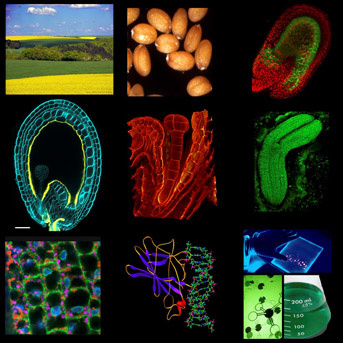IJPB Master 2 proposals
Two subjects in the team
> Transcriptional regulation of suberin biosynthesis and its impact on seed physiology
Supervisor: Sébastien Baud, contact
The quality of seeds, utilized for food uses, as raw material for industries, and as propagation vectors for agriculture and biodiversity preservation, depends on both their content and their germination vigor. In oilseed species, the seed coat directly affects these two aspects by taking part in embryo nutrition while ensuring its protection against abiotic constraints such as heat. Certain integumentary layers produce a lipid polyester called suberin, which is deposited on the surface of cells and whose biophysical properties are particularly well suited to the various functions assigned to the seed coat. Preliminary data suggest that suberin may play a more important role in seed physiology when seeds are exposed to periods of high heat during development and/or storage.
In the model species Arabidopsis thaliana, a group of closely related MYB transcription factors regulate the suberin biosynthetic pathway in the different cell types that produce this polymer. Among these MYBs, MYB9 and MYB107 activate suberin production in the seed coat during seed development. Mutations in the genes encoding these transcription factors have been shown to affect suberin deposition, seed coat permeability and seed dormancy. However, we do not know how perturbations in suberin deposition affect seed development and germination vigor, particularly in response to abiotic stresses (e.g. high temperature). The project aims to characterize in detail the gene network directly activated by MYB9 and MYB107 and to study the effects of altered suberin deposition on seed physiology during development, storage and germination.
Références
> To et al. AtMYB92 enhances fatty acid synthesis and suberin deposition in leaves of Nicotiana benthamiana. The Plant Journal (2020) 103, 660-676. DOI: 10.1111/tpj.14759
> Lashbrooke et al. MYB107 and MYB9 homologs regulate suberin deposition in Angiosperms. The Plant Cell (2016) 28, 2097-2116. DOI: 10.1105/tpc.16.00490
> Kazaz et al. Differential activation of partially redundant Δ9 stearoyl-ACP desaturase genes is critical for omega-9 monounsaturated fatty acid biosynthesis during seed development in Arabidopsis. The Plant Cell (2020) 32, 3613-3637. DOI: 10.1105/tpc.20.00554
> Troncoso-Ponce et al. Transcriptional activation of two delta-9 palmitoyl-ACP desaturase genes by MYB115 and MYB118 is critical for biosynthesis of omega-7 monounsaturated fatty acids in the endosperm of Arabidopsis seeds. The Plant Cell (2016) 28, 2666-2682. DOI: 10.1105/tpc.16.00612
> Barthole et al. MYB118 represses endosperm maturation in seeds of Arabidopsis. The Plant Cell (2014) 26, 3519-3537. DOI: 10.1105/tpc.114.130021
> Biochemical and multi-omic analyses to characterize the network controlling glucosinolate modifications in seed responses to warm temperature
Supervisor: Massimiliano Corso, contact
Co-Supervisor: Léa Barreda, contact
Plants produce thousands of specialized metabolites (SMs) with diverse biological activities that are critical in the interactions of plants with their environment (Barreda et al., 2024b; Corso et al., 2020). Among these metabolites, glucosinolates [GSL] are massively and specifically accumulated in seeds of Brassicaceae species, including the model species Arabidopsis thaliana (Barreda et al., 2024a, 2024b). GSL play a well-known role in plant response to biotic stresses and affect seed agronomic quality. These compounds are also accumulated in plants and seeds subjected to abiotic stresses such as high temperatures (Barreda et al., 2024b). Nevertheless, their role and regulation in response to these stresses are not known.
Our team documented a strong environmentally-induced plasticity of many SMs, including GSL, in seeds (Alberghini et al., 2022; Boutet et al., 2022). In addition, our metabolomic and transcriptomic data revealed that warm temperature applied to A. thaliana plants during the fructification period induced a strong accumulation of modified (e.g. benzoylated and sinapoylated) GSL in seeds, concomitant with a significant up-regulation of
genes involved in their biosynthesis (unpublished). We also highlighted the altered physiological quality and metabolic landscapes of A. thaliana seeds of three mutants for genes putatively involved in GSL accumulation and modifications when plants are subjected to warm temperatures during the fructification period (unpublished). The genes and corresponding enzymes identified by previous analyses and involved in GSL regulation will be the
object of the proposed internship. A detailed characterization of the role of these genes in controlling the GSL network in seeds and the activity of the corresponding enzymes is crucial to identify new SMs and related mechanisms controlling seed composition in response to warm temperature stress. In this context, the student will carry out/participate in the detailed characterization of these mutants and enzymatic activities of the corresponding
enzymes by:
1\ Further analyzing multi-omic data to identify new candidates involved in seed GSL accumulation and/or
regulation
2\ Help with the characterization of the activities of the corresponding enzymes of the three genes
(substrates and putative reaction products)
3\ Help with the complementation of the knockout mutants and
production of overexpressing mutant lines for these genes.
Références
> Alberghini, B., Zanetti, F., Corso, M., Boutet, S., Lepiniec, L., Vecchi, A., Monti, A., 2022. Camelina [ Camelina sativa ( L .) Crantz ] seeds as a multi-purpose feedstock for bio-based applications. Ind. Crop. Prod. 182, 114944. https://doi.org/10.1016/j.indcrop.2022.114944
> Barreda, L., Brosse, C., Boutet, S., Klewko, N., Vos, D. De, Francois, T., Collet, B., Grain, D., Boulard, C., Bernay, B., Perreau, F., Lepiniec, L., Rajjou, L., Corso, M., 2024a. Multi-omic analyses unveil temporal and spatial distribution of specialized metabolites in seeds of Camelina sativa. bioRxiv doi: https://doi.org/10.1101/2024.05.31.596893
> Barreda, L., Brosse, C., Boutet, S., Perreau, F., Rajjou, L., Lepiniec, L., Corso, M., 2024b. Specialized metabolite modifications in Brassicaceae seeds and plants: diversity, functions and related enzymes. Nat. Prod. Rep. 41, 834–859. https://doi.org/10.1039/d3np00043e
> Boutet, S., Barreda, L., Perreau, F., Totozafy, J.-C., Mauve, C., Gakière, B., Delannoy, E., Martin-Magniette, M.-L., Monti, A., Lepiniec, L., Zanetti, F., Corso, M., 2022. Untargeted metabolomic analyses reveal the diversity and plasticity of the specialized metabolome in seeds of different Camelina sativa genotypes. Plant J. 110, 147–165. https://doi.org/10.1111/tpj.15662
> Corso, M., Perreau, F., Mouille, G., Lepiniec, L., 2020. Specialized Phenolic compounds in seeds: structures, functions, and regulations. Plant Sci. 296, 110471. https://doi.org/10.1016/j.plantsci.2020.110471

Leader:
Loïc Lepiniec